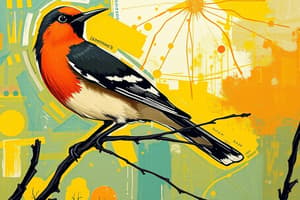Podcast
Questions and Answers
How does Jem symbolize the theme of the journey from youth and innocence to maturity and knowledge in Chapter 12?
How does Jem symbolize the theme of the journey from youth and innocence to maturity and knowledge in Chapter 12?
Jem no longer wants to play the usual games with Scout. He corrects her behavior, spends time in his room, and is described as difficult to live with, inconsistent, and moody.
Why is Dill not coming to Maycomb this summer?
Why is Dill not coming to Maycomb this summer?
Dill has a new father and they are going to build a fishing boat.
Why must Atticus leave for two weeks?
Why must Atticus leave for two weeks?
Atticus has to go to the state legislature for an emergency session called by the governor.
What is the name of Calpurnia's church and what is the significance of the name?
What is the name of Calpurnia's church and what is the significance of the name?
Briefly describe Calpurnia's church. How does it differ from Jem and Scout's usual church?
Briefly describe Calpurnia's church. How does it differ from Jem and Scout's usual church?
What incident occurs when Scout and Jem arrive at the church?
What incident occurs when Scout and Jem arrive at the church?
What prompts Reverend Sykes to order the doors be closed?
What prompts Reverend Sykes to order the doors be closed?
Why is Helen Robinson finding it difficult to get work lately?
Why is Helen Robinson finding it difficult to get work lately?
What is Tom Robinson being accused of?
What is Tom Robinson being accused of?
What is linin' and why is it done?
What is linin' and why is it done?
What do Scout and Jem learn about Calpurnia in this chapter?
What do Scout and Jem learn about Calpurnia in this chapter?
Why does Aunt Alexandra come to visit?
Why does Aunt Alexandra come to visit?
What is Aunt Alexandra's major theory concerning human behavior?
What is Aunt Alexandra's major theory concerning human behavior?
How does Scout explain the caste system in Maycomb?
How does Scout explain the caste system in Maycomb?
What information does Atticus relay to the children from Aunt Alexandra?
What information does Atticus relay to the children from Aunt Alexandra?
How do the last paragraphs indicate that Atticus was following Aunt Alexandra's directions?
How do the last paragraphs indicate that Atticus was following Aunt Alexandra's directions?
How is the trial affecting Scout and Jem's visits to town?
How is the trial affecting Scout and Jem's visits to town?
How does Atticus explain rape to Scout?
How does Atticus explain rape to Scout?
What does Alexandra want Atticus to do to Calpurnia?
What does Alexandra want Atticus to do to Calpurnia?
What does Scout think is under her bed?
What does Scout think is under her bed?
What does Jem do that shocks Dill and Scout?
What does Jem do that shocks Dill and Scout?
Study Notes
Journey from Innocence to Maturity
- Jem's character development symbolizes the theme of transitioning from childhood innocence to maturity.
- He shows signs of growing up by distancing himself from Scout, adopting a moody demeanor, and focusing on reading rather than play.
- Jem’s increased appetite represents his physical growth, while his behavior reflects emotional changes.
Dill's Absence
- Dill will not visit Maycomb this summer due to his new father's plans to build a fishing boat.
- Scout feels profound sadness over Dill's absence, expressing that life without him is "unbearable."
Atticus's Emergency Session
- Atticus must attend an emergency session called by the governor regarding economic troubles in the county.
- The backdrop includes increasing unemployment and poverty during the Great Depression, leading to escalating social tensions.
Calpurnia's Church
- First Purchase African Methodist Episcopal Church is significant as it was funded by the first earnings of freed slaves.
- The church experience contrasts with Jem and Scout's usual service, lacking hymn books and utilizing a direct contribution method for offerings.
Racial Intolerance Encounter
- Upon arriving at the church, Scout and Jem encounter racial prejudice from Lula, who initially objects to their presence.
- Calpurnia and her son Zeebo advocate for them, leading to acceptance and welcoming from the congregation.
Fundraising for Helen Robinson
- Reverend Sykes orders the church doors closed after discovering that the collection is below $10 needed to support Helen Robinson and her children.
- Helen struggles to find work due to the community's reaction to her husband Tom's imprisonment.
Tom Robinson's Accusation
- Tom faces serious allegations of raping Mayella Ewell, with Bob Ewell being the accuser.
- This sets the stage for the racial and social tensions present in the storyline.
Unique Church Practices
- "Linin'" is a practice where the congregation sings hymns line-by-line due to the illiteracy affecting most members.
- This practice highlights the community's resourcefulness and unity despite their challenges.
Calpurnia's Dual Identity
- Scout and Jem learn that Calpurnia is literate, smarter than they previously believed, and has her own background that differs from their expectations.
- They come to understand Calpurnia's adaptation to different social contexts, including how her language changes at church versus home.
Aunt Alexandra's Arrival
- Aunt Alexandra visits with the intention of instilling lady-like qualities in Scout and emphasizing the Finch family’s superiority.
- Scout does not welcome her presence and feels judged, believing Aunt Alexandra thinks poorly of her.
Heredity as a Measure of Worth
- Aunt Alexandra holds a theory that heredity determines a person's worth, judging families based solely on their lineage and residence duration.
- Jem challenges this notion by citing the Ewells' poor social standing despite their long history in Maycomb.
Maycomb's Caste System
- Scout observes a social hierarchy in Maycomb, describing it as a caste system entrenched in longstanding community traditions.
- This "system" consists of unwritten societal rules governing interactions among residents based on their family history.
Atticus's Communication
- Atticus shares Aunt Alexandra’s belief that the Finch family is special, but he clearly disagrees with this sentiment.
- His reluctance to adopt Aunt Alexandra's views strains his relationship with the children, causing emotional distress for Scout.
Atticus's True Feelings
- Despite adhering to Aunt Alexandra's directions, Atticus acknowledges to the children that family lineage should not dictate their merit.
- He advises them to disregard notions of superiority linked to their heritage.
Children’s Experience in Town
- The trial surrounding Tom Robinson impacts Jem and Scout's interactions in town, where they endure scrutiny and judgment from townspeople.
- They are marked by their association with the Robinson case, facing derogatory remarks like "Yonder's some Finches."
Atticus on Rape
- Atticus explains to Scout that rape constitutes non-consensual sexual intercourse, aiming for clarity on an uncomfortable topic.
- His frankness reflects his commitment to educating his children about societal realities.
Aunt Alexandra's Views on Calpurnia
- Alexandra desires Atticus to dismiss Calpurnia, but he affirms her importance as a family member and caregiver.
- Atticus recognizes Calpurnia's positive influence on Scout and Jem, valuing her judgment and the role she plays in their lives.
Dill’s Covert Presence
- Scout thinks there is a snake under her bed, only to discover that it is actually Dill hiding there.
- This reflects the friendship and bond among the children, showcasing their sense of adventure.
Jem's Moment of Maturity
- Jem surprises Dill and Scout by informing Atticus of Dill's presence, breaking their prior code of secrecy.
- This action highlights Jem’s growing maturity and responsibility, indicative of his development as he learns the importance of family concern.
Studying That Suits You
Use AI to generate personalized quizzes and flashcards to suit your learning preferences.
Description
This study guide focuses on key themes and character developments in chapters 12 to 20 of 'To Kill a Mockingbird'. It highlights Jem's transformation from innocence to maturity, providing insights into his relationship with Scout and his changing behavior. Explore the evidence that marks this significant growth in Jem's character.




